An OSS man from Toledo tells how he retrieved downed American airmen in Yugoslavia.
By Arthur Jibilian
Born April 30, 1923, in Cleveland, Ohio, I was raised in Toledo, Ohio, by my cousins, Sarkis “Sam” and Oksana “Agnes” Jibilian. I attended Lagrange and Nathan Hale grade schools and graduated from DeVilbis High school.
When Japan attacked Pearl Harbor, I attempted to enlist in the Navy Air Corps. However, I missed a letter on the eye exam and was advised to come back in a couple of weeks. But Sarkis was diagnosed with lung cancer and I decided to stay with him until he passed away. He died January 19, 1943.
I was drafted into the Navy March 15, 1943, and went to boot camp at Great Lakes [Great Lakes Naval Training Station, in North Chicago, Illinois]. I then began training as a radioman, learning Morse code and naval protocol.

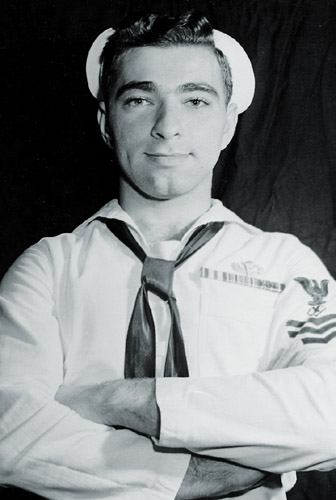
After completing navy radio school, Arthur Jibilian (seen here in 1945) volunteered for duty with the Office of Strategic Services. (Courtesy of Arthur Jibilian)One day, a Lt. Commander Green from the Office of Strategic Services (OSS) visited our base. He wanted to talk to all those who spoke a foreign language. I spoke Armenian, so was interviewed by him. In my case, Armenian wasn’t particularly important, but he said that OSS needed radio operators desperately. Radio operators, usually in conjunction with a “team,” would parachute behind enemy lines and relay information re troop movements, activities. [OSS teams] might blow up bridges or railroad tracks, and harass the Germans in any way possible.
He pointed out that the missions were voluntary and extremely dangerous. He was very up-front about everything. I told him that I was interested and volunteered. (After all, I was more expendable as I had no immediate family and I might, just possibly, be more valuable with OSS than if I were on a ship.)
Just prior to taking my radioman exam, I received orders from OSS to report to Washington, DC. I was placed on “detached temporary duty with the Office of Strategic Services.” They taught me to code and decode messages, operate their three-piece radio consisting of a transmitter, receiver and power pack. It all fit into a small suitcase so that one could “mingle in a crowd” carrying it, looking like a refugee or traveler.
We then went to Ft. Benning, Georgia, for parachute training. Normal training takes five weeks. We made it in seven days. We made three jumps there and then two more at Ft. Bragg, taking part in army maneuvers with Special Ops groups.
We were then sent overseas, via liberty ships, ending up in Cairo, Egypt, staying in one of the villas occupied by President Roosevelt during the Teheran Conference [actually the Cairo Conference, the November 1943 summit meeting on Asia with UK Prime Minister Winston Churchill and Generalissimo Chiang Kai-shek of the Republic of China]. I also looked up and found some Jibilian relatives in Cairo. That is another story.
I was informed that a Lt. Eli Popovich would be interviewing radio operators for a mission into Yugoslavia. Col. Lynn Farish and Lt. Popovich were going into Yugoslavia and needed a radio operator. Col. Farish had been in Yugo before, but had had no radio operator, being dependent on the British Missions to relay his reports. This was not acceptable to him, or to OSS. I was thrilled when Eli (we were quite informal in OSS) selected me.
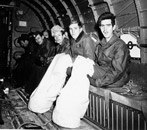
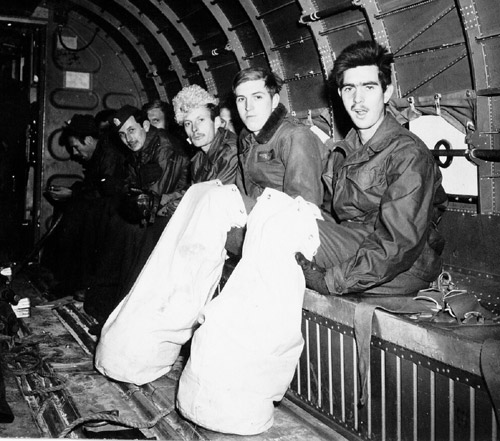
After throwing their shoes to the undersupplied Serbs who had kept them alive and safe, rescued American bomber men warm their feet in duffle bags during the plane ride out of Yugoslavia. (Courtesy of Arthur Jibilian)We parachuted into Partisan territory [portions of Yugoslavia controlled by communist, Axis-fighting guerrilla groups] on March 15, 1944. Initially, I failed to make radio contact with base, and everyone, including me, began to doubt my competence. Finally making contact, we discovered that base had not been listening for us, as the mission was scheduled to be cancelled. We were just getting comfortable when the Germans, using a direction finder, locked in on my radio signals. When I began transmitting, German Stukas and Messerschmitts strafed and dive-bombed our positions.
We were forced to jettison every piece of excess equipment when the Germans sent a contingent after us. They pursued us for six nights and five days. We were in summer khakis and as we climbed the mountain trails, the air became colder and colder. We ran into snow, sometimes sinking so deep that we had to help each other lift our feet out of the drifts. When we stopped for a 10-minute break, we were soaked with sweat and the clothes literally froze to our bodies. When we started to “pocret” [Serbo-Croat pokret, march, move], we quickly generated enough heat to melt the ice. We had little to eat, subsisting on goat cheese and bread with straw, given to us by the Serbian peasants. We all suffered from diarrhea.
Going back down, we finally got to a warmer elevation. We also heard of some airmen that the Serbs were hiding from the Germans. We had to go though a German “checkpoint” to reach them, or take a long eight-day march around the checkpoint. We decided to risk the checkpoint. We were told we could bribe the guards (Farish had $20 gold pieces) and they would allow us to sneak through in the dark. We got halfway through when something went terribly wrong. Flares went up and a searchlight began probing for us. I fired at the searchlight and it went out. I think everyone shot at the light, so I cannot take credit for hitting it. Amid all the confusion, we all made it through safely. We picked up about a dozen airmen who had been shot down while bombing the oil fields of Ploesti. [These were Americans who had been shot down during the August 1943 bomb raid on the refineries of Ploesti, Romania, on which Germany depended for its military fuel.] We brought them out with us.
This mission lasted only two months, but was the toughest two months, mentally and physically, in my life. We were sent to a rest camp in Naples, Italy. I had lost a lot of weight, but, being young, it didn’t take me long to regain it, especially with he relative abundance of good things to eat. I was awarded the Silver Star for this mission and am extremely proud of it.
Shortly afterwards, Col. [George] Kraigher of the 15th Air Force contacted OSS. [Kraigher, who had flown for Serbia in World War I, commanded the Air Crew Rescue Unit (ACRU), a Mediterranean Allied Air Forces unit attached to the US 15th Army Air Force and flying out of Brindisi, Italy.] He had received word that there were 50 American airmen in the area of Pranjani, Yugoslavia [Serbia]. These airmen were shot down while bombing the oil fields of Ploesti. Gen. Draja Mihailovich [Drazˇa Mihailovic´], leader of the Chetniks [guerrillas of the royalist, anti-communist Yugoslav Army in the Fatherland], had gathered these men, protected them, fed them, and brought them all together in one area so that the Americans could “rescue” them. The Halyard Mission [the OSS codename for the rescue], composed of Capt. George “Guv” Musulin, Lt. Mike Rajacic and Navy Radio Operator Arthur “Jibby” Jibilian, volunteered to parachute in and evacuate them. The mission would take seven to ten days, it was estimated.
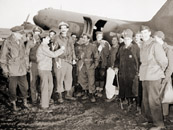
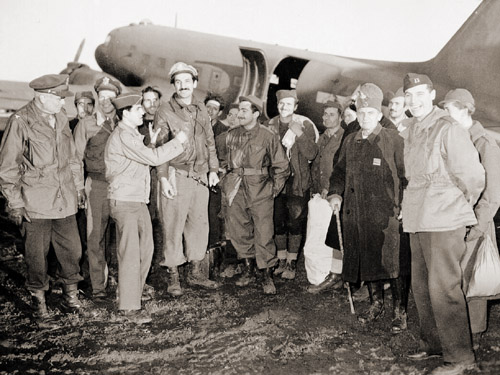
In Italy on December 28, 1944, after his second OSS mission, Jibilian (center) stands with OSS Captain Nick Lalich (left of center), airlift commander Colonel George Kraigher (far left), and OSS Captain George Vuynovich (far right). (Courtesy of Arthur Jibilian)In order for the reader to appreciate what follows, I must digress for a moment and give a little background. When the Germans invaded Yugoslavia, Gen. Mihailovich took off into the hills and waged guerilla warfare against the Germans. He was hailed as a hero by the Allies, and, when possible, supplies were dropped to aid him in his fight against the invaders. Several British missions also were dropped in to help him and gather intelligence information. One individual from OSS, Capt. George “Guv” Musulin, also parachuted in to Mihailovich’s headquarters. He had no radio operator and relayed information through the British. A movie, titled The Fighting Chetniks, was made, depicting Mihailovich’s courageous fight against the Nazi invaders. [Chetniks, also called The Fighting Guerrillas, was released in 1943 by Twentieth Century-Fox, and was directed by Louis King.]
When the Germans invaded Russia, Josip Broz, better known as Marshal Tito, also organized guerillas [the Partisans] to fight the Germans. Mihailovich welcomed him. Tito started a campaign to communize villages. Mihailovich asked him to stop, saying that they were soldiers, not politicians. “Let’s drive the Germans out of our land, and then we can worry about the type of government we want,” he told Tito. Nevertheless, Tito persisted and civil war broke out between the partisans of Marshal Tito and the Chetniks of Mihailovich. The Allies were unable to solve the situation between them, and Russia was exerting pressure to back Tito and abandon Mihailovich. The British finally agreed and, to our shame, so did we.
The Allies now had to justify their abandonment of Mihailovich. They did this by simply stating that he was a collaborator and that they would no longer support him. All aid was given to the Partisans of Marshal Tito, who used the guns and ammunitions against Mihailovich more often than against the Germans. With their superior weapons and firepower, the Partisans kept the Chetniks on the run, even though the majority of the Serbian people supported Mihailovich. All air force personnel were told that, if shot down over Yugo, they were to seek out the Partisans of Marshal Tito, as the Chetniks would cut off their ears and turn them over to the Germans.
Therefore, when Col. Kraigher asked for a mission to go into Mihailovich territory, political concerns were raised. If we went in and rescued the airmen, how could Mihailovich be called a collaborator? The British were vehemently opposed to anyone going into Chetnik territory on any pretext, as were the Russians.
We were told that Gen. Bill Donovan, head of OSS, and President Roosevelt were discussing the situation. The president mentioned that the British were unhappy with the proposed mission. Gen. Donovan is alleged to have replied: “Screw the British, let’s get our boys out.”
As a result of these “political concerns” our mission was delayed and/or aborted a dozen times. We were to jump on July 3, but it was not until August 2, 1944, that we finally jumped into Pranjani. Musulin asked for an American pilot, American plane and an American jumpmaster, the morning of August 2. We were in Yugo that night.
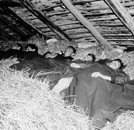
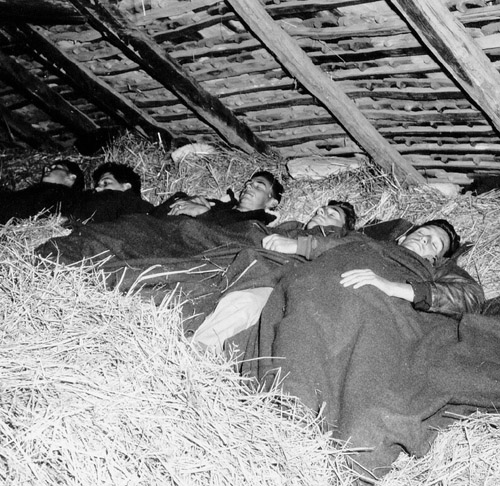
Serbs offered downed US airmen food, safety, and rustic hospitality. (Courtesy of Arthur Jibilian)We found not 50 Americans, but 250! Many were in bad shape, having been wounded by flack and/or sustained injuries upon landing or while attempting to evade capture by the Germans. I cannot say enough about the care and protection that our wounded received from the Chetniks and the Serbian people. They risked their lives to shelter and protect our boys. The peasants fed the wounded when they, themselves, had nothing to eat. You must remember that the land had been ravaged by the Germans and the civil war further depleted the resources of the farmers, giving meaning to the phrase “they were dirt poor.”
It was decided to have a daylight evacuation, since there were so many. Since there was a German garrison at Cacac [Cacak], about 20 miles away, the fighter escorts [which accompanied the ACRU C-47 cargo planes that would haul the rescued airmen away] were to dive-bomb and strafe them so that they would not be a factor in the evacuation.
We found a suitable landing strip and cleared it of rocks and debris, using oxen when necessary to get rid of large boulders and fill in pot holes. It was truly amazing to watch the Americans, the Chetniks, and the farmers all working together to get the “airfield” done.
On August 10, the C-47s, escorted by P-51 Mustangs and P-38 Lightning fighters, arrived. While the fighters strafed Cacac, the C-47s landed, were loaded, and departed quickly. It was truly a beautiful “Air Show.”
Unfortunately, probably because of his passionate defense of Mihailovich, Musulin was recalled. He was replaced by Capt. Nick Lalich.
Gen. Mihailovich informed us that there were many more American airmen throughout his territory and he would funnel them to us, if we so desired. We received permission to stay, and what started out as a l0-day mission lasted almost six months, during which we evacuated 513 shot-down American airmen, and “several” British, French and Italians.
Due to the fact that many of the airmen required medical attention, Dr. [Jacques] Mitrani [an ACRU medical officer], together with two medical assistants were sent in to help take care of the wounded and sick airmen.
Another OSS mission, Ranger, comprising Col. McDowell, Capt. Milodragovich, and radio operator Mike Devyak, was dispatched, coming in on one of the planes that evacuated the airmen. I heard discussions that a German general was willing to surrender, but not to a mere colonel. However, I didn’t hear all that went on between headquarters and the Ranger mission, so I have no idea of the details. All I heard was that we missed an opportunity to accept the surrender of a German general.
When the airmen were loaded into the plane, many of them took off their shoes and threw them out for the Chetniks and farmers. Shoes were in short supply and greatly appreciated…. In return, many were given “opankas,” the native slipper.
The Ranger mission was also evacuated, leaving Capt. Lalich and me as the sole mission in Mihailovich territory. We stayed until Dec. 29, 1944.
[Jibilian, Lalich, the evacuees, and the other ACRU operatives were flown to Italy.] After a quick physical and a long, hot shower, I collapsed into a bed. The next morning, I had eight eggs, probably a pound of bacon, six slices of toast, butter, and jam, and I can’t remember how many cups of coffee. Food never tasted so good! However, my elation was tempered with the thought of the poor Serbs who had sacrificed (and were still sacrificing) for the Americans.
Having spent two months with the forces of Marshal Tito, and six months with Mihailovich, the contrast was amazing. The Partisans shadowed us, never leaving us alone with the villagers. They were always tense, and villagers were ill at ease in their presence. Once, when we were alone with a family, we were asked: “Why are the Allies backing Tito?” I had been told to simply say: “Only God knows.” Being deeply religious, they accepted our answer.
In contrast, [with the Chetniks] villagers flocked out happily, strewing flowers in Mihailovich’s path and singing and celebrating his return. All available food was scrounged so that a virtual feast could be prepared. The villagers donned their native costumes and danced and sang in Mihailovich’s honor. It was obvious that they literally adored him….
[After recuperating in Italy,] we followed the Fifth Army’s advance up the “boot” until my orders came to return to the States. OSS returned me to the navy and I was discharged in September 1945.
I obtained employment with the VA [Veterans Administration] in Washington, DC. Reading the Post one morning, I came across a small article on the front page: “Tito’s forces capture Mihailovich.” I was stunned and shook up. Knowing that Mihailovich felt abandoned by the Allies, I decided to tell the story of the Halyard Mission to the Washington Post. I saw the editor and told him my story and how Mihailovich had saved 513 American airmen.
I did not know it, but the rescued airmen had kept in touch with one another. They met at Ft. Stephens in Chicago and sent a 20-man delegation to Washington. They contacted me and we organized a “mission to save Mihailovich” campaign. We distributed pamphlets, contacted the State Department, our senators, and representatives. We asked for only: 1. Let the rescued airmen testify at his trial; 2. Allow OSS personnel to testify at his trial; and 3. Move the trial to a neutral country so Mihailovich would get a fair trial.
Even though we knew Mihailovich was doomed, we felt that if we could at least see him and let him know that we hadn’t forgot him, he would die more peacefully. Tito’s reply: “This is an internal matter and will be handled by us.” We tried valiantly, but Washington is a town full of very powerful lobbyists, and our efforts paled in comparison with the money and influence they had.
Mihailovich was tried and executed as a collaborator. In his last speech, he concluded by saying: “The truth is for everyone.” This is the truth. The story of a hero and martyr.
In September 2004, I received an invitation from the Serbian government to participate in the dedication of a memorial plaque in Pranjani, the site of the first evacuation of the 250 airmen. Only Clare Wilson and Bob Wilson, rescued pilots, were able to attend. George Vuynovich and I, representing OSS, were also there.
We really received the VIP treatment! Foreign Minister Vuk Draskovic´ spared no effort to make our stay a memorable one. We were wined and dined till we couldn’t dine and wine any more. Reporters, commentators, and all the media people were there to publicize our presence and chart our every move. It was a very emotional reunion. My wife was able to see some of the wonderful, gracious, and generous people that I had talked about, which was icing on the cake.
Then, in May 2005, we received another invitation to participate in the presentation of the Legion of Merit to Mihailovich’s daughter. President Harry Truman had awarded the Legion of Merit to Mihailovich in 1948, but due to the hostile government, it would not be presented until the government was no longer against the award.
The presentation was a quiet, private, affair. The American ambassador informed us that there would be no publicity as there was much “delicate” negotiation going on.
I had taken copies of the Halyard Mission photos with me and showed them to Mihailovich’s daughter. She was thrilled and, at the conclusion of the ceremonies, I left the album with her.


FOLLOW US »
